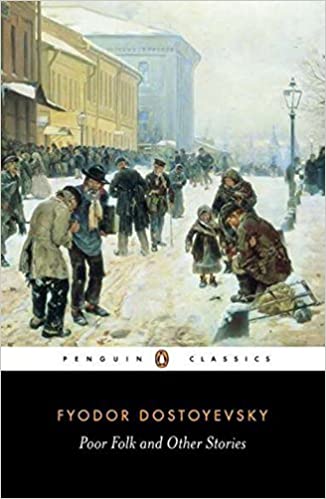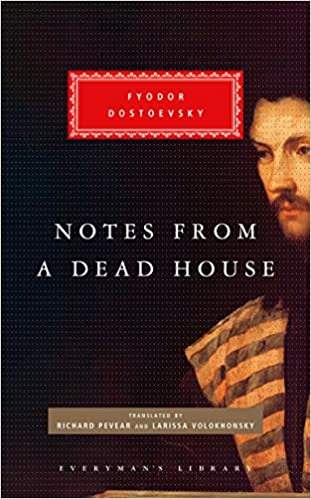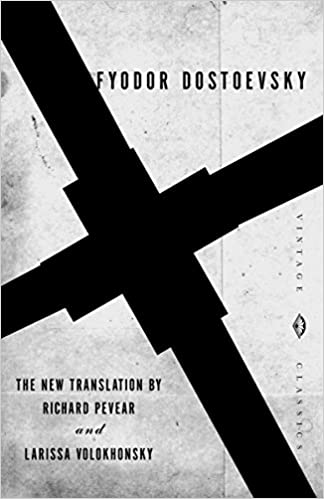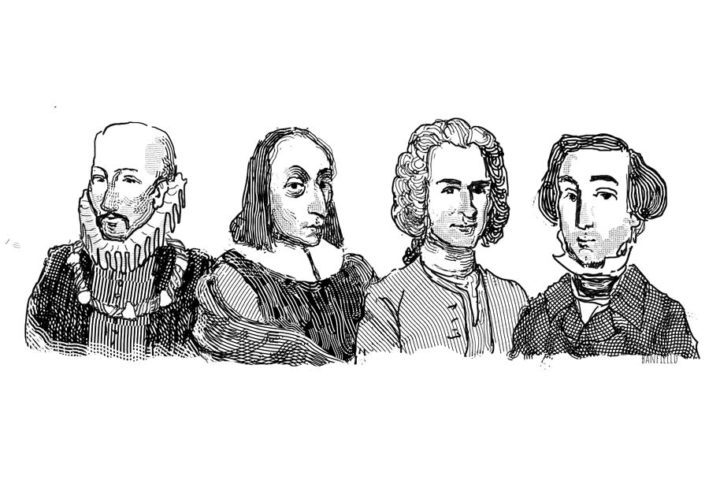Discussed In This Essay
Amid the consternation that seized the civilized world after Vladimir Putin’s invasion of Ukraine, a university in Italy briefly cancelled, and then reinstated, a course on the works of Fyodor Mikhailovich Dostoevsky (1821–1881). This gut reaction was part of a headlong rush to condemn all things Russian in solidarity with Ukraine’s plight. But Dostoevsky, whose novels speak of universal pain while focusing on distinctly Russian problems, saw and lamented exactly how modernity would deform and distort the country he loved. The irony is that Dostoevsky’s prescient diagnoses of the Russian and the human condition have more to teach us now than ever.
About suffering, Dostoevsky became quite expert from an early age. His beloved mother died when he was 15, and he was left to the untender ministrations of his father, a doctor and small landowner. Dr. Dostoevsky was a capricious martinet ruled by pathological suspicion and severe, nearly constant depression. This whole psychic mess was exacerbated rather than relieved by an inborn sense of spiritual election: as the son and grandson of eminent Orthodox Christian priests, he knew he was one of God’s chosen, and he expected to be treated as such. Fathers were still patriarchs in full force in those days, and Dr. Dostoevsky saw it as his prerogative to determine his children’s professions, their own reluctance and misery notwithstanding. Fyodor and his brother Mikhail were assigned to become military engineers. Each wanted to be a writer, and both would end up becoming just that—but not before suffering profound torment under the iron discipline of St. Petersburg’s Academy of Military Engineers.
Dr. Dostoevsky died in 1839. Most believed his serfs had murdered him, overpowering their abusive landlord and forcing vodka down his throat until he drowned. Fyodor had not seen the man for two years. He was probably unaware of his father’s recent descent into hell-bent drinking, the hallucinated conversations he had with his dead wife, and the illegitimate child he had fathered by one of his housemaids. Sigmund Freud, in a 1928 article entitled “Dostoevsky and Parricide,” attributed the onset of the writer’s epilepsy to Oedipal guilt over his father’s death. In truth, though, the falling sickness did not make its appearance until years later. The murder’s more obvious and resounding moral effect on Dostoevsky was to inspire his hatred of serfdom, an injustice as abhorrent as American chattel slavery, and not abolished until 1861. Dostoevsky was remarkable even among the young radicals of the time in the fervor of his loathing for Russia’s peculiar institution. His political passion and his first novel, Poor Folk (1846), won him the tutelage of Vissarion Belinsky, a prominent young literary and social critic. Theirs would be a whirlwind romance: Dostoevsky would later describe Belinsky as the evil genius who lured the innocent Christian into atheism and socialism, propelling him on his way to prison and Siberian exile.
Caught in the Meshes
By 1847, the mutual infatuation was finished. Belinsky was a Hegelian leftist, disdainful of old pieties and purposefully extravagant in his abuse of Jesus Christ. Dostoevsky, who never quite overcame his vestigial reverence for Christ, found Belinsky’s blasphemy too much to tolerate. He sought new but not altogether better company in a debating society convened by Mikhail Butashevich-Petrashevsky—another Hegelian leftist who habitually erupted in rage against that scoundrel and begetter of scoundrels, Christ. Why exactly Dostoevsky preferred Petrashevsky to Belinsky is unclear. Yet Dostoevsky became attached to the Petrashevsky Circle, and subsequently to a more radical splinter group led by Nikolai Speshnev, an alluring aristocrat who would be a model for the practicing nihilist Nikolai Stavrogin in the 1872 novel Demons. The Third Section, the Tsarist secret police, took a keen interest in any hint of subversion or indeed any suggestion of criticism at all—especially after 1848, an annus horribilis which saw epidemic influenza and revolutionary fervor tear through Europe. When the authorities moved against the Petrashevsky Circle in 1849, Dostoevsky was caught in the meshes.
The most damning charge against him was having given a reading to the Circle of Belinsky’s Letter to Gogol, a defiant screed attacking time-honored political and religious orthodoxies. The military-civil court sentenced Dostoevsky and 14 others to death by firing squad. They were to be shot three at a time; the first trio was bound to stakes, and the military executioners prepared to fire. Dostoevsky, among the next three in line, knew he had just five minutes to live. Only then did an officer arrive on horseback to announce the tsar’s mercy. The mock execution drove one of the reprieved men permanently out of his mind. It compelled Dostoevsky to re-examine, under the aspect of eternity, all he had ever done or believed in. Back in his prison cell, he burst into joyful song, fortissimo. In a letter to his brother, he poured out the fullness of his remorse and his ecstasy:
When I look back on my past and think how much time I wasted on nothing, how much time has been lost in futilities, errors, laziness, incapacity to live; how little I appreciated it, how many times I sinned against my heart and soul—then my heart bleeds. Life is a gift, life is happiness, every minute can be an eternity of happiness…. Now, in changing my life, I am reborn in a new form.
Further agonies were still to come before Dostoevsky could consider his soul fully formed. He still had to weather four years of katorga, or penal labor, in western Siberia. As a rare “gentleman” criminal, a political prisoner, he was reviled on principle by the low-life mass of rapists and murderers. His body in shackles and his mind in agony, Dostoevsky sought doggedly to purify his soul, poring over the New Testament Bible which was his only permitted reading material. The cold rationalism of the utopian circles he once moved in came to seem inadequate: “One may be mistaken in ideas, but it is impossible to be mistaken with one’s heart,” he wrote from Siberia to an old friend. Release was followed by banishment from European Russia and impressment into a Siberian army battalion—while all the time, his epilepsy was getting worse. Little by little, with the help of influential friends, he won promotion and then at last release on medical discharge. The authorities permitted him to return to St. Petersburg, and lifted the prohibition on publishing his writing.
Modern Mind
Prison and exile taught Dostoevsky how he really wanted to live, and what he wanted to write. It showed him that vile moral deformity and unexpected beauty can be knit closely together in a single soul. To endure life at its most cruel and revolting was the necessary preliminary to loving life in every respect, which meant living as far as possible in accordance with Christ’s example in thought, word, and deed. This period of captivity and servitude, for all its bitterness, was spiritually liberating. Marcel Proust wrote astutely that “forced labor was probably the stroke of good fortune which set free his inner life.” Dostoevsky was proud of his hard-won spiritual kinship with the poorest Russians, and he insisted that his rivals, Ivan Turgenev and Leo Tolstoy, only pretended to know what he had learned through terrible experience.
In Memoirs from the House of the Dead (1861-62), Dostoevsky’s novelistic account of his imprisonment, he lives cheek by jowl with monsters who have slit children’s throats for pleasure. Yet he also encounters convicts who, despite their wicked crimes, have a saving goodness in them. This discovery of some basic virtue among even the lowest of the common people would inform his subsequent work. In Memoirs, even a touch of kindness from the warders can become a catalyst of resurrection: “God knows, treatment as a human being may transform into a man again even one in whom the image of God has long been eclipsed.” Already in this early work, one sees Dostoevsky’s mighty hope for the Russian soul.
But transformation came hard for Dostoevsky, and by inches. Shortly after being released from prison, he wrote to Natalia Fonvizina, a radical of an earlier generation, that he simply did not have the makings of a true believer: “I am a child of this century, a child of doubt and disbelief, I have always been and shall ever be (that I know) until they close the lid of my coffin.” And yet God blessed him with “moments of great tranquility,” in which he saw clearly “that there is nothing more beautiful, more profound, more sympathetic, more reasonable, more courageous, and more perfect than Christ; and there not only isn’t, but I tell myself with a jealous love, there cannot be.” In such moments Dostoevsky was lifted to a fever pitch of devotion beyond reason: “[I]f someone succeeded in proving to me that Christ was outside the truth, and if, indeed, the truth was outside Christ, I would sooner remain with Christ than with the truth.” For all his doubts, the way before him was becoming clearer. He produced five masterworks over the next quarter century, each greater than the one before: Notes from Underground, Crime and Punishment, The Idiot, Demons, and The Brothers Karamazov. The last two stand with the best of Tolstoy at the pinnacle of modern literature.
It is not surprising that Friedrich Nietzsche called Dostoevsky “the only psychologist from whom I had anything to learn.” Dostoevsky saw and experienced much of the inner turmoil that the modern man of pure mind must undergo. In Notes from Underground (1864), he presents what Nietzsche would call a man of ressentiment: a nihilist from intellectual arrogance and personal inferiority, for whom the world that exists ought not to, and the world that ought to exist does not. Life is not good enough for him, because he is unfit to live. He is the man who cannot stop thinking and cannot stop writing, proud of nothing so much as his ideas—even though they ultimately bring pain and frustration bordering on madness.
Scribbling away in his tiny cellar room, the Underground Man suffers from himself, from being “a mouse and not a man.” His scrawny body betrays and shames his masterful mind. A swaggering lieutenant picks him up and moves him when he gets in the way, and he devotes colossal energy to imagining how he’ll get even. Where Aristotle exalted as god-like the man who thinks of eternal things which cannot be other than they are, the Underground Man considers the entire universe subject to his own intellect, so he can deny that 2 plus 2 equals 4 if it doesn’t suit him. Yet such denial only yields further confusion and consternation, for every thought engenders its contradiction, and he can make nothing definite of himself; he despairs that he cannot even make himself an insect. Dostoevsky’s spokesman for the life of higher consciousness doesn’t have a clue about how to live—
what to join, what to hold to, what to love and what to hate, what to respect and what to despise…. We’re stillborn, and have long ceased to be born of living fathers, and we like this more and more. We’re acquiring a taste for it. Soon we’ll contrive to be born somehow from an idea.
Here is the modern mind par excellence: sterilized and born artificially, detached from its own soul.
The Moral Law
Can such a man be saved? Only through the suffering he brings upon himself in the wilds of the mind. In Crime and Punishment (1866), Rodion Raskolnikov, an impoverished sometime student in St. Petersburg, cogitates his way into committing murder. As we eventually discover, he has convinced himself “that an ‘extraordinary’ man has the right…that is, not an official right, but his own right, to allow his conscience to…step over certain obstacles, and then only in the event that the fulfillment of his idea—something perhaps salutary for the whole of mankind—calls for it” (Dostoevsky’s ellipses). Raskolnikov imagines himself to be just such a Napoleonic Übermensch. He resolves to kill an old woman pawnbroker and rob her to fund his own brilliant intellectual career. As his scheme develops, forces beyond his control seem to impel him toward the fateful act: “[L]ater on he was always inclined to see a certain strangeness, a mysteriousness, as it were, in this whole affair, the presence as of some peculiar influences and coincidences.” Chance encounters and overheard rumors, demonic manipulation or divine providence, or maybe just the effects of coincidence on an overheated imagination: Dostoevsky won’t say what is at work, but the smart money is on some sinister agent of the invisible powers.
Raskolnikov butchers the crone with an axe, and is compelled to kill her sister as well. Yet he discovers that he is not above the moral law after all. Immediately he starts to feel as though he has severed ties with the human race: “A dark sensation of tormenting, infinite solitude and estrangement suddenly rose to consciousness in his soul.” It is not an idea that speaks to him, but the soul’s awful certainty, “a spontaneous sensation, the most tormenting of any he had yet experienced in his life.” The urge to confess, to talk to someone, to re-establish some kind of human connection, very nearly overcomes him. He had not counted on being plagued by conscience.
The canny and relentless detective Porfiry Petrovich eventually nails Raskolnikov with a psychological profile: “‘There are bookish dreams here, sir, there is a heart chafed by theories.’” The detective lets the guilty man go for lack of evidence, but assures him that he will return to confess. And that is what Raskolnikov does, aflame with contrition inspired by the piety and love of Sonya Marmeladov, an erstwhile prostitute of necessity and a saint by vocation. Sonya follows him to Siberia, where he is to serve an eight-year prison sentence. By Sonya’s persistent love, he is led to the Gospels. Not unlike Dostoevsky himself in Siberia with his Bible, Raskolnikov finds freedom from his own fevered mind in the scourge of suffering: “Instead of dialectics, there was life.”
Affliction of the Intellect
Such triumph of spiritual conviction over intellectual hubris was one of Dostoevsky’s governing preoccupations after exile. In “The Russian Point of View” (1925), Virginia Woolf, one of the great appreciators of literary sensibility, homes in on the soul’s supreme interest for Dostoevsky. “It has slight connection with the intellect. It is confused, diffuse, tumultuous, incapable, it seems, of submitting to the control of logic or the discipline of poetry.” The modern temptation to venture beyond good and evil is a peculiar affliction of the intellect, and Dostoevsky knew it well. Woolf’s more analytical French contemporary, André Gide, writes in Dostoevsky (1923) that “if I seek to know what part mind plays in Dostoevsky’s novels, I realize that its power is demonic.” Dostoevsky sees extreme spiritual peril in formidable intelligence. His characters only stand a chance of saving their souls once they overcome their infatuation with their own brainpower.
But the appeal of utopian reasoning is strong, and not all modern men transcend it. In Demons, Dostoevsky presents a premonition of Russia’s 20th-century national tragedy, the socialist upheaval whose rationalist arrogance and moral darkness would wreak havoc on an ancient civilization. Demons is a study etched in the acid of moral and social collapse: the worst of the common people come “under the command of that small group of the ‘vanguard’ which acts with a definite goal.” The men of bad ideas lead to perdition those who’ve never had a thought in their lives. Dostoevsky shows an entire provincial society in acute psychic distress, eager to destroy and not particular about what is destroyed. As an arson fire rages in town, the governor cries, fecklessly but shrewdly, “‘The fire is in people’s minds, not on the rooftops.’”
Lurking behind this crisis is the sometime engineer and militant atheist Kirillov, who has for four years cut himself off from normal human contact and fixated on his idea to replace the God-man, Christ, with the first man-god, himself. He intends by his suicide to found a worldwide death cult, for by ceasing to fear death and killing himself eagerly, every person will become God. Desperate, extreme, lethal ideas taken to the point of implosion: such is Dostoevsky’s legacy to modern philosophers, who adopt his most unsavory characters’ thoughts as their own and jettison his intolerable love of Christ. Albert Camus would declare, “There is but one truly serious philosophical problem, and that is suicide.” His compatriot Jean-Paul Sartre would feverishly describe the existential crisis one faces every time he passes a fourth-floor window. Both thinkers’ doctrinaire atheism and Sartre’s Stalinism would have earned Dostoevsky’s scorn.
Not everyone is as committed as Kirillov to self-destruction as serious moral philosophy: some people just want to watch the world burn. The modern American reader will feel a tremor of recognition at the words of Pyotr Verkhovensky, ringleader of a socialist revolutionary band at the heart of the catastrophe:
“[T]he teacher who laughs with children at their God and at their cradle, is already ours…. Schoolboys who kill a peasant just to see how it feels, are ours. Jurors who acquit criminals right and left, are ours. The prosecutor who trembles in court for fear of being insufficiently liberal, is ours, ours. Administrators, writers—oh, a lot of them, an awful lot of them are ours, and they don’t know it themselves!”
Here in America, nowadays, they do tend to know it. And they are proud.
Verkhovensky hero-worships Nikolai Stavrogin, a sort of nihilist performance artist who commits barbarities for their shock value, but also to find out just how far he is capable of descending into patent evil. In a chapter that Dostoevsky intended for publication, but the censor struck out, Stavrogin confesses to a monk of exceptional holiness that he has raped a pubescent girl, who consequently killed herself. (The chapter is included entire as an appendix in the translation of the novel by Richard Pevear and Larissa Volokhonsky.) Stavrogin possesses all the equipment that would qualify him for worldly success and earthly happiness, but such possibilities are foreclosed by his unruly renegade intellect. Capable of decency and even magnanimity, he repeatedly chooses moral ugliness, often for its entertainment potential. The young beauty who loves him and whom he ruthlessly seduces, Lizaveta Tushin, finds eroticism at its most malign and disgusting in their coupling: “‘It has always seemed to me that you would bring me to some place where there lives a huge, evil spider, as big as a man, and we would spend our whole life there looking at him and being afraid.’”
The acknowledged dean of Dostoevsky critics, Mikhail Bakhtin, states in Problems of Dostoevsky’s Poetics (1929) that the novelist’s greatness consists in the feelings that his play of ideas inspires. Dostoevsky shows how the question of God’s existence or non-existence penetrates every human life, and presents the upshot of Stavrogin’s godless sensuality, moral indifference, and emotional incapacity in an unforgettable image of his lover’s pain and horror. His death suits his nature perfectly: having announced that he would never shoot himself, he hangs himself instead, the ignoble end befitting a common criminal.
Breadth and Depth of Soul
Perfervid thought in Dostoevsky becomes an ordeal rather than the rarest pleasure, as it was for the classical Greek philosophers, or a useful instrument of the active life, as it has become for most American thinkers. In A Writer’s Diary for May 1876, a compendium of his own observation and philosophizing that was published in monthly installments, Dostoevsky writes, “We have many inappropriate thoughts, and it is they that crush us. Here in Russia an idea falls on a person like a huge boulder and half crushes him; there he is, squirming under it, unable to get free. Some people accept living crushed, while others do not, and they kill themselves.”
The four brothers of The Brothers Karamazov (1880) all labor under this distinctively Russian burden of thought, and each displays a different possible response. The novel’s inciting incident is the murder of their father, a reprobate not unlike Dostoevsky’s own. Dmitri Karamazov, the father’s romantic rival, is wrongly convicted. The real murderer, the bastard Smerdyakov, hangs himself—the better to pin the crime on the innocent. The atmosphere is one of moral overcast threatening perpetual darkness, but irradiated by the wondrous goodness of the youngest son, the monastic novice Alyosha.
Father Zosima, Alyosha’s elder in the monastery, instructs him to go out into the world and find out what it holds. In grappling with the aftermath of his father’s death, he becomes entangled in passionate dialogue with Ivan Karamazov, the final brother and the one with the most remarkable mind. The world’s evil, especially the unspeakable suffering of children, leaves Ivan disgusted with God’s creation—although he finds the existence of God extremely doubtful. In an unanswerable retort to the theodicy of Gottfried Leibniz, Ivan proclaims the incompatibility of human decency with divine wisdom: “‘I don’t want [eternal] harmony, for love of mankind I don’t want it. I want to remain with unrequited suffering. I’d rather remain with my unrequited suffering and my unquenched indignation, even if I am wrong.’” This rejection of Christ echoes and inverts Dostoevsky’s own professed devotion to Him, even if the truth lies elsewhere. Ivan tells Alyosha the tale of the Grand Inquisitor, who greets Christ’s second coming with scorn and the threat of auto da fé, for having promised humanity such happiness and delivered so little. Christ’s gentle kiss on the Inquisitor’s lips moves him to set his prisoner free, with the admonition never to come again. “‘The kiss burns in his heart, but the old man holds to his former idea.’” Heart and mind have a hard time coming to terms for Dostoevsky’s metaphysical rebels.
Ivan likewise holds to his idea that if there is no God or immortal human soul, “everything is permitted.” He has it both ways: if God exists, He is monstrous, and if He doesn’t, man is free to be as monstrous as he wishes. Dostoevsky depicts savage evil against the background of theoretical turmoil. Conversations that begin innocently enough quickly become pitched toward hysteria or delirium; minds are infected with rot by the yellow press, idle gossip, and progressive Western ideas about the unfreedom of the human will; serious ideas amount to offal when the mediocre get hold of them.
Happy the man who does not suffer from an overmastering idea but lives instead for his soul. Here is Alyosha after the death of his beloved Father Zosima, entranced by the stars like Dante having ascended from the Inferno:
Filled with rapture, his soul yearned for freedom, space, vastness. Over him the heavenly dome, full of quiet, shining stars, hung boundlessly…. The silence of the earth seemed to merge with the silence of the heavens, the mystery of the earth touched the mystery of the stars.
Alyosha falls to the ground, embracing the earth, weeping ecstatically, asking forgiveness for all mankind. When he gets up, he knows he will have the strength for whatever life may send him. “‘Someone visited my soul in that hour,’ he would say afterwards, with firm belief in his words.” It is the most rapturous moment in modern literature, one which only Dostoevsky, with the breadth and depth of a soul greater even than his searching mind, could have written.












